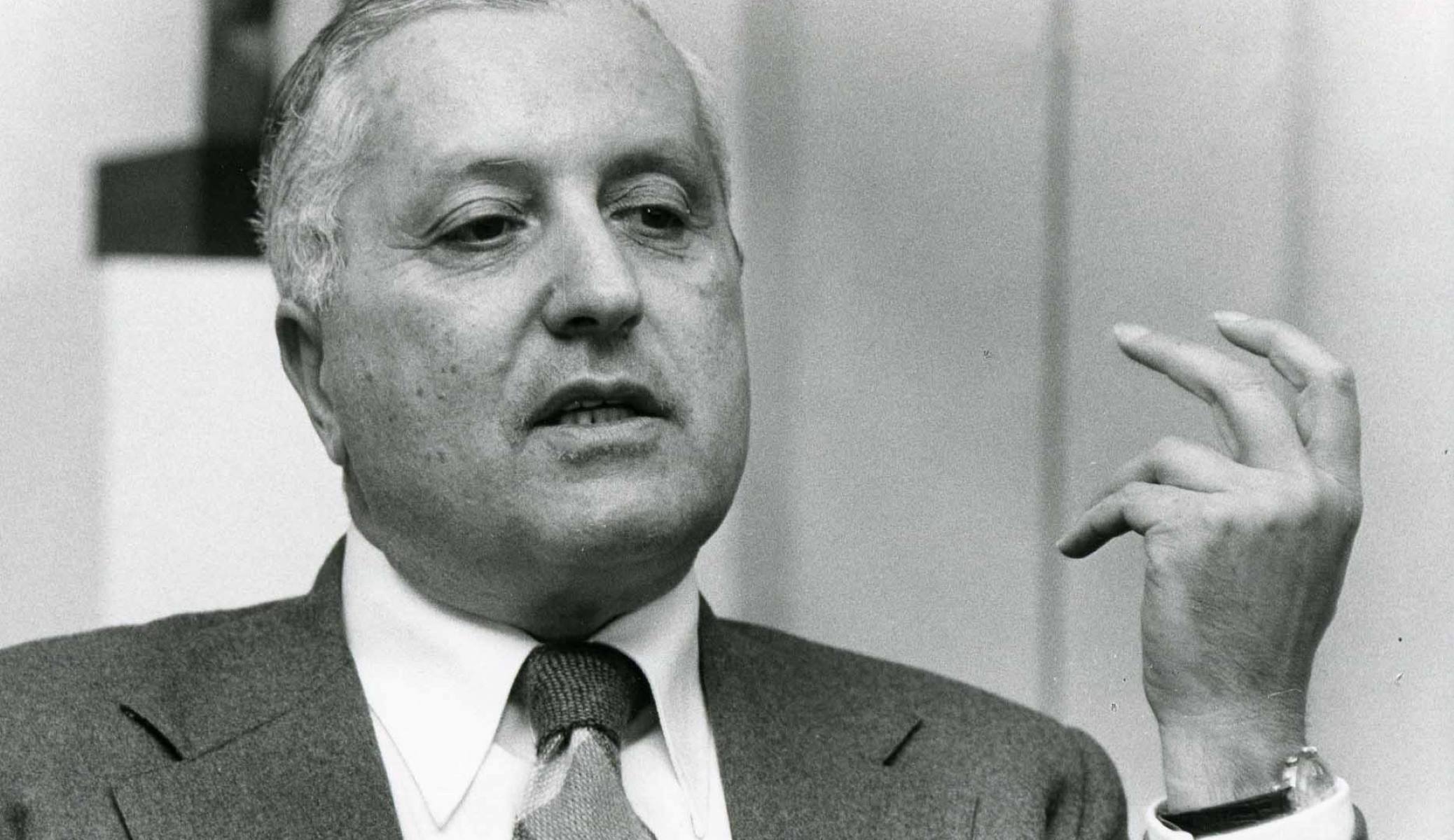
Dr. Ilya Prigogine was a remarkable and pioneering figure in the world of science. His contributions revolutionized the field of thermodynamics and earned him numerous accolades, including the Nobel Prize in Chemistry in 1977. But there is much more to know about this extraordinary scientist. In this article, we will uncover 11 fascinating facts about Dr. Ilya Prigogine that highlight his incredible achievements, innovative ideas, and impact on the scientific community. From his groundbreaking work on dissipative structures to his deep insights on complex systems, Dr. Prigogine’s legacy continues to inspire and shape our understanding of the universe. So, buckle up and get ready to delve into the life and work of this extraordinary mind.
Key Takeaways:
- Dr. Ilya Prigogine’s groundbreaking work in non-equilibrium thermodynamics and dissipative structures revolutionized our understanding of complex systems, inspiring future generations of scientists.
- His interdisciplinary approach and advocacy for collaboration between scientific and humanistic disciplines have left a profound impact on philosophy, social sciences, and the way we perceive the world.
Nobel Prize in Chemistry Recipient
Dr. Ilya Prigogine, a renowned Belgian physical chemist, was awarded the Nobel Prize in Chemistry in 1977 for his groundbreaking work in non-equilibrium thermodynamics. His pioneering research revolutionized our understanding of complex systems and their behavior.
Work on Dissipative Structures
One of the key contributions of Dr. Prigogine was his study of dissipative structures. He demonstrated that systems far from equilibrium, such as chemical reactions or biological processes, could exhibit spontaneous self-organization and create ordered structures.
Introduction of the “Prigogine Equation”
Dr. Ilya Prigogine developed the Prigogine equation, which is a mathematical formulation used to describe the behavior of nonlinear systems. This equation is widely utilized in various scientific disciplines to analyze complex phenomena.
Author of Numerous Books
Dr. Prigogine was not only a brilliant scientist but also a prolific author. He wrote several influential books and papers, including “Order out of Chaos: Man’s New Dialogue with Nature” and “The End of Certainty: Time, Chaos, and the New Laws of Nature.” These works continue to inspire and shape scientific thinking today.
Founder of the Center for Complex Quantum Systems
Dr. Prigogine founded the Center for Complex Quantum Systems at the University of Texas at Austin. This interdisciplinary research center focuses on the study of complex systems, quantum mechanics, and their applications in various fields.
Research on Self-Organization in Biology
Dr. Ilya Prigogine extended his research beyond chemistry and explored self-organization in biological systems. His work shed light on the emergence of order in living organisms, challenging the traditional reductionist view of biology.
Recipient of Numerous Awards and Honors
Throughout his career, Dr. Prigogine received numerous awards and honors, including the Rumford Medal, the Wolf Prize in Chemistry, and the title of Baron in Belgium. These recognitions reflect his immense contributions to the field of science and his impact on the scientific community.
Collaboration with other Eminent Scientists
Dr. Prigogine collaborated with many prominent scientists, including Albert Einstein, with whom he had discussions on the interpretation of quantum mechanics. This collaboration showcases the respect and recognition his work garnered from peers.
Advocate for the Unity of Science and Humanities
Dr. Ilya Prigogine believed in the integration of scientific and humanistic approaches to gain a deeper understanding of nature and the world. He stressed the importance of dialogue and cooperation between different disciplines to address complex global challenges.
Impact on Philosophy and Social Sciences
Not limited to the realm of natural sciences, Dr. Prigogine’s work influenced philosophy and social sciences. His theories of complexity and self-organization have prompted new ways of thinking about the nature of reality, time, and human societies.
Legacy in Education and Research
Dr. Prigogine’s extraordinary legacy continues to inspire future generations of scientists and researchers. His work paved the way for advancements in various scientific fields, providing a framework for understanding complex systems and their behavior.
The Impact of Dr. Ilya Prigogine’s Work
Dr. Ilya Prigogine’s extraordinary work has left an indelible mark on the scientific community. His research on non-equilibrium thermodynamics, dissipative structures, and self-organization has revolutionized our understanding of complex systems.
By receiving the Nobel Prize in Chemistry, Dr. Prigogine’s contributions were recognized and celebrated on a global scale. His studies on the emergence of order and complexity in natural phenomena have had a profound impact on various scientific disciplines, including chemistry, biology, physics, and beyond.
Dr. Prigogine’s insights and mathematical formulations, such as the Prigogine equation, have provided scientists with powerful tools to analyze and unravel the complexities of the natural world. His work continues to inspire further research and innovation in fields ranging from ecological systems to social dynamics.
Beyond his scientific achievements, Dr. Prigogine was an advocate for interdisciplinary collaboration and dialogue. He emphasized the need for bridging the gap between scientific and humanistic approaches, recognizing the interconnectedness of knowledge across different fields.
In conclusion, the 11 extraordinary facts about Dr. Ilya Prigogine highlight his immense contributions to the field of science and his role as a visionary thinker. His work has not only advanced our understanding of complex systems but has also influenced philosophy, social sciences, and the way we perceive the world.
Conclusion
In conclusion, Dr. Ilya Prigogine was an extraordinary individual who made significant contributions to the field of science. His groundbreaking work in the field of non-equilibrium thermodynamics revolutionized our understanding of complex systems, dissipative structures, and the concept of time. His research earned him numerous prestigious awards, including the Nobel Prize in Chemistry in 1977.Prigogine’s ideas continue to inspire scientists and researchers across various disciplines. His work not only impacted the scientific community but also had implications for fields such as biology, physics, and even social sciences.Through his studies, Prigogine taught us that chaos and disorder can lead to self-organization and emergence of new structures. His legacy reminds us to embrace uncertainty and complexity and seek novel solutions to the challenges we face.Dr. Ilya Prigogine’s groundbreaking research and visionary thinking have left an indelible mark on the scientific community. His work serves as a reminder of the endless possibilities that lie in the exploration of the unknown.
FAQs
Q: Who is Dr. Ilya Prigogine?
A: Dr. Ilya Prigogine was a renowned Belgian physical chemist and Nobel laureate. He is best known for his contributions to the field of non-equilibrium thermodynamics.
Q: What is non-equilibrium thermodynamics?
A: Non-equilibrium thermodynamics is a branch of physics that deals with the study of systems that are not in thermodynamic equilibrium. It focuses on understanding the behavior and dynamics of systems that are far from equilibrium.
Q: What did Dr. Ilya Prigogine discover?
A: Dr. Ilya Prigogine discovered the concept of dissipative structures, which are self-organizing systems that maintain a stable state far from equilibrium. His work also introduced the role of fluctuations and instabilities in the emergence of order in complex systems.
Q: What awards did Dr. Prigogine receive?
A: Dr. Ilya Prigogine received numerous awards throughout his career, including the Nobel Prize in Chemistry in 1977. He was also a recipient of the Rumford Medal and the Wolf Prize in Chemistry.
Q: How did Dr. Prigogine’s work impact other fields?
A: Dr. Ilya Prigogine’s work had a significant impact on various fields, including biology, physics, and social sciences. His ideas of self-organization, dissipative structures, and the arrow of time have influenced and inspired researchers in diverse disciplines.
Q: What is the significance of Dr. Ilya Prigogine’s legacy?
A: Dr. Ilya Prigogine’s legacy lies in his groundbreaking contributions to the understanding of complex systems and dynamics. His work continues to shape our understanding of how order arises from chaos and how nature evolves far from equilibrium.
Ilya Prigogine's groundbreaking work in thermodynamics and complex systems earned him widespread acclaim. His contributions, along with those of fellow Nobel Prize in Chemistry laureate Dr. Barry Sharpless, have profoundly impacted scientific understanding. Prigogine's insights into dissipative structures and self-organization also paved the way for advancements in chaos theory, a field pioneered by Edward Lorenz. Explore more fascinating facts about these remarkable scientists and their transformative discoveries.
Was this page helpful?
Our commitment to delivering trustworthy and engaging content is at the heart of what we do. Each fact on our site is contributed by real users like you, bringing a wealth of diverse insights and information. To ensure the highest standards of accuracy and reliability, our dedicated editors meticulously review each submission. This process guarantees that the facts we share are not only fascinating but also credible. Trust in our commitment to quality and authenticity as you explore and learn with us.


